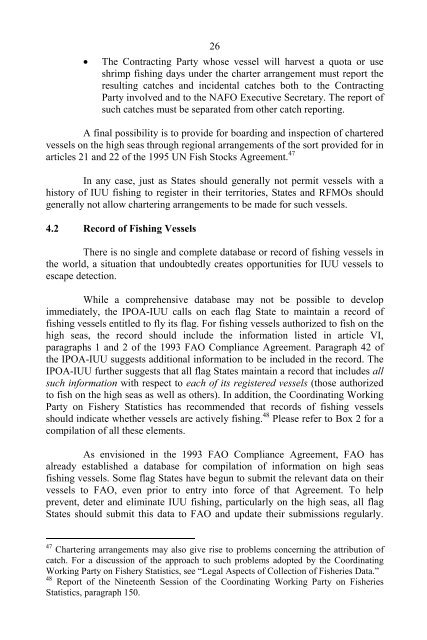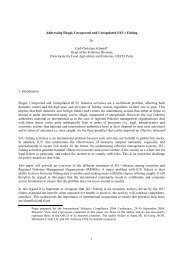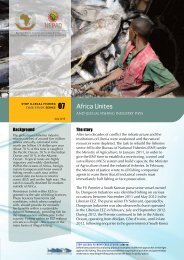Implementation of IPOA/IUU - International MCS Network
Implementation of IPOA/IUU - International MCS Network
Implementation of IPOA/IUU - International MCS Network
Create successful ePaper yourself
Turn your PDF publications into a flip-book with our unique Google optimized e-Paper software.
26The Contracting Party whose vessel will harvest a quota or useshrimp fishing days under the charter arrangement must report theresulting catches and incidental catches both to the ContractingParty involved and to the NAFO Executive Secretary. The report <strong>of</strong>such catches must be separated from other catch reporting.A final possibility is to provide for boarding and inspection <strong>of</strong> charteredvessels on the high seas through regional arrangements <strong>of</strong> the sort provided for inarticles 21 and 22 <strong>of</strong> the 1995 UN Fish Stocks Agreement. 47In any case, just as States should generally not permit vessels with ahistory <strong>of</strong> <strong>IUU</strong> fishing to register in their territories, States and RFMOs shouldgenerally not allow chartering arrangements to be made for such vessels.4.2 Record <strong>of</strong> Fishing VesselsThere is no single and complete database or record <strong>of</strong> fishing vessels inthe world, a situation that undoubtedly creates opportunities for <strong>IUU</strong> vessels toescape detection.While a comprehensive database may not be possible to developimmediately, the <strong>IPOA</strong>-<strong>IUU</strong> calls on each flag State to maintain a record <strong>of</strong>fishing vessels entitled to fly its flag. For fishing vessels authorized to fish on thehigh seas, the record should include the information listed in article VI,paragraphs 1 and 2 <strong>of</strong> the 1993 FAO Compliance Agreement. Paragraph 42 <strong>of</strong>the <strong>IPOA</strong>-<strong>IUU</strong> suggests additional information to be included in the record. The<strong>IPOA</strong>-<strong>IUU</strong> further suggests that all flag States maintain a record that includes allsuch information with respect to each <strong>of</strong> its registered vessels (those authorizedto fish on the high seas as well as others). In addition, the Coordinating WorkingParty on Fishery Statistics has recommended that records <strong>of</strong> fishing vesselsshould indicate whether vessels are actively fishing. 48 Please refer to Box 2 for acompilation <strong>of</strong> all these elements.As envisioned in the 1993 FAO Compliance Agreement, FAO hasalready established a database for compilation <strong>of</strong> information on high seasfishing vessels. Some flag States have begun to submit the relevant data on theirvessels to FAO, even prior to entry into force <strong>of</strong> that Agreement. To helpprevent, deter and eliminate <strong>IUU</strong> fishing, particularly on the high seas, all flagStates should submit this data to FAO and update their submissions regularly.47 Chartering arrangements may also give rise to problems concerning the attribution <strong>of</strong>catch. For a discussion <strong>of</strong> the approach to such problems adopted by the CoordinatingWorking Party on Fishery Statistics, see “Legal Aspects <strong>of</strong> Collection <strong>of</strong> Fisheries Data.”48 Report <strong>of</strong> the Nineteenth Session <strong>of</strong> the Coordinating Working Party on FisheriesStatistics, paragraph 150.
















